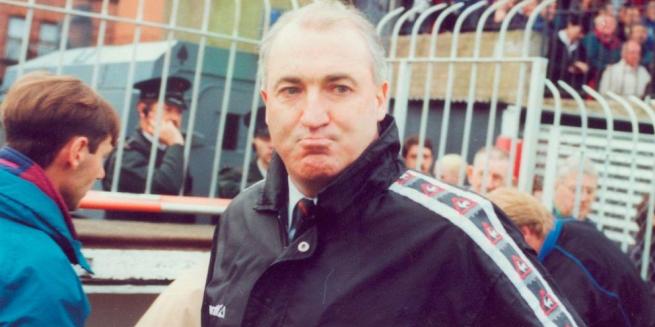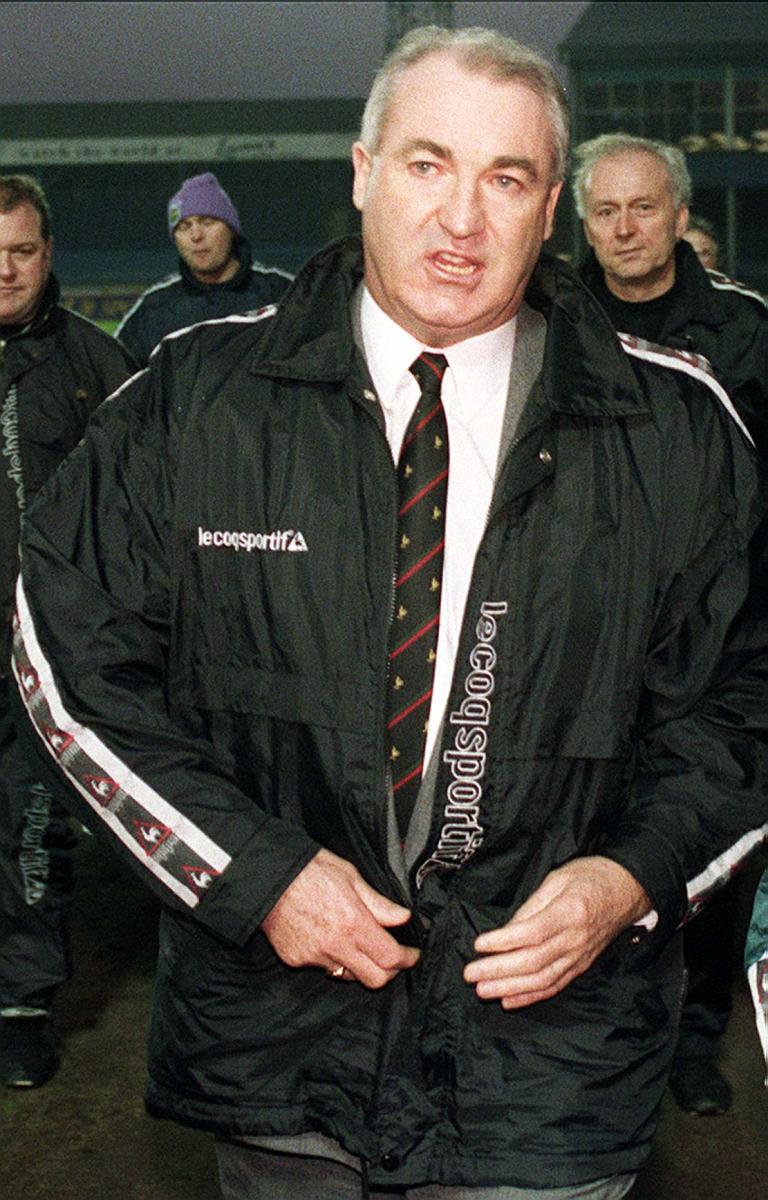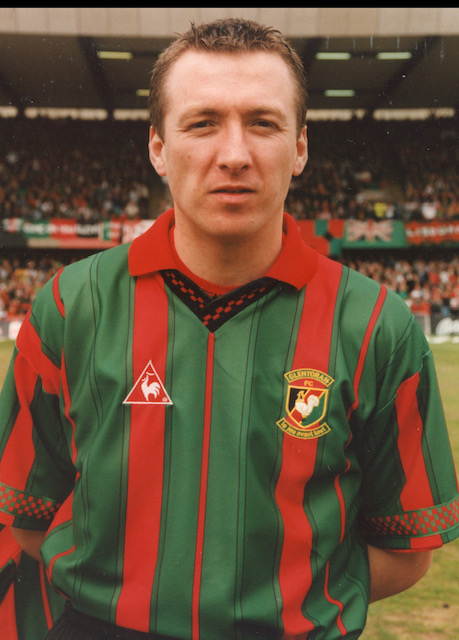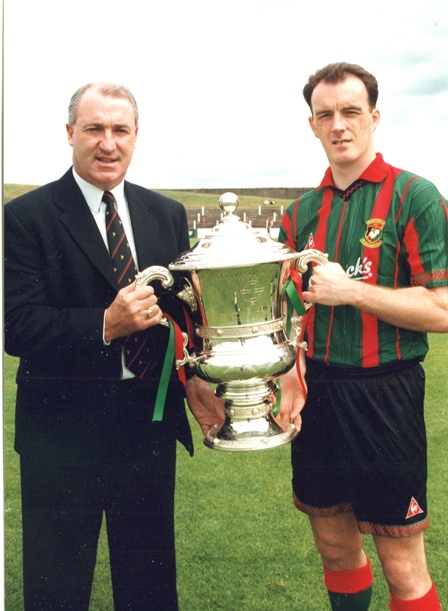
For the fourth in this series on our league or cup winning managers of the past four decades, we concentrate on Tommy Cassidy For this piece, spoke to Jim Cleary, captain during the Cassidy era, for some of his insider’s thoughts on the period. A full interview with John on his Glentoran career will start here next week.
TOMMY CASSIDY (1994-1997)

Tommy Cassidy’s name hadn’t been in wide circulation when he was suddenly announced as Robert Strain’s replacement as Glentoran manager in June 1994. In fact, it seemed that Strainer was likely to stay for the following season. That was going to be one of the most pivotal seasons in our history as the end of that season was to see promotion and (more frighteningly) relegation to the Irish League for the first time. Only 8 teams were to be in the new Premiership with a 2-season formula worked out on the basis of adding the league places of the two seasons together. We had finished ninth the previous season, and even then only on goal difference from tenth placed Coleraine. So, the clear belief that the very lowest we could finish to avoid the drop was sixth. Even that wasn’t a stone-cold certainty.
Tommy Cassidy was 43 when he took the job and had been away from the Irish League since leaving the Glens (his only local club) for Newcastle United in 1970. He’d had a great career at Newcastle and Burnley, winning 24 caps for Northern Ireland and being a member of the squad at Espana 82. So, we knew who we were getting but had no idea what we were getting. What we did know was that a lot of quick rebuilding was needed, and it needed to work!
Unlike our previous four managers, Tommy Cassidy wasn’t going to be able to use players from our great 1980s teams as part of even his short-term rebuilding plans. Billy Caskey and Johnny Jameson had retired, and Gary Macartney had retired from senior football. Alan Paterson was forty, Barney Bowers 35, while Raymond Morrison and George Neill were both 32. Realistically only striker Justin McBride, centre backs John Devine and Gary Smyth, and left back Michael Smyth could be said to be proven senior players with the scope to improve in the years to come.
Cassidy moved quickly to clear the decks for new players, with strikers Gary Hillis and Stephen Douglas, neither of whom had featured much under Strain, were released. The most controversial departure was that of Raymond Morrison to Ards. While not the player of 3 or 4 years previously, “Nuts had still managed 11 goals from midfield the previous season, just three les than top scorer Neil Candlish. Cassidy said of this decision: “He’s a great lad. He came into pre season and worked very hard, both in training and in the games, but at 32 he just wasn’t what I needed. I’m told he’s the sort of player who finishes things off, but I didn’t have anyone who could start things off. It’s a matter of priority.” Striker Neil Candlish, our record signing the previous summer, also left, having demanded a move to Portadown. While embarrassing to lose a big name forward following Raymond Campbell the previous summer, Candlish frankly hadn’t made much of an impression in his season in East Belfast and there was little sense of regret around the Oval.
The immediate signings were very North West focused, not an area we’d been active in since the sixties. First, highly rated NI U21 keeper Declan Devine came in from Omagh Town. Next in was the high profile signing of midfielder and former League of Ireland Player of the Year Donal O’Brien from Derry City, and young teenage striker Roddy McDowell, who’d been released by Middlesbrough. Then came Scottish winger Eddie Cunnington and 30-year old English midfielder David Martindale, who had played over 200 games for Tranmere Rovers. Young players Darren Parker and Damian Kelly had established themselves as first teamers the previous season and were expected to figure heavily.
In an interview with Glentoran fanzine “A Nightmare on Dee Street” shortly after his appointment, Cassidy said a couple of things that would still resonate with supporters years later. First, he said “This summer the Glens have gone heavily into debt for the first time in its history, but that’s what you need to do ……. good housekeeping and balancing the books are no use unless you you’re winning things ……. Football clubs operate in a state of permanent debt and those debts are handed down from board to board and chairman to chairman, The Glens have to be the same.” The supporters (and successive boards) accepted this logic in 1994, but fifteen years later we were all to be confronted with the consequences.
Of his own plans, Tommy said: “We’re not a bad side. If every team in the league plays to their full potential, we’ll be in the top four. That’s not bad after last season. We’re just two players short of challenging Linfield week after week.” As Colin Nixon said in his interview, that last sentence came to be associated with the whole Cassidy reign at the Oval.
Tommy Cassidy's first squad, pre season 1994-1995
Centre half John Devine had been a first team regular for seven seasons by this stage and became Cassidy’s captain. He said of the new manager's arrival and impact: “Tommy had been in full time football for over 20 years, so he worked hard to bring those sort of disciplines to Glentoran. There was a wee bit less familiarity than there would have been with Tommy Jackson or Strainer. For a while Tommy rotated the captaincy as Barney and Geordie Neill weren’t as regular as before. He tried Donal O’Brien and Trevor Smith, then at one training session he came to me and said ‘listen John I want you to be captain, You’re going to play every week and I know what you’ll bring to the job.’ Then he told me exactly what he wanted from his captain. Obviously, I was delighted to take on the job and I think we were a successful team.”
1994-95: The season got off to the worst possible start with a 5-1 away Ulster Cup defeat to Carrick Rangers. Cassidy’s first Glentoran team was: D.Devine, Lennox, M.Smyth, Parker, G.Smyth, O’Brien, A.Nixon, D.Kelly, McDowell, Cunnington, McBride. To make matters worse, Decan Devine was sent off on his debut. As D-Ream were singing that year, things can only get better. We hoped.
We improved and even won the Gold Cup in October, helped by reserve keeper Neil Armstrong’s heroics in the penalty shoot out against Crusaders, just three months into Cassidy’s reign. But the season will always be defined by and remembered for the 6-game winning run at the end of the season that saved us from relegation.
By the time this run started, Cassidy had been very busy in the transfer market. In had come striker Trevor Smith from Portadown (who scored 19 in his 36 starts, including 5 in the vital run), left back Conor McCaffrey back after two years at Ards, ROI U21 international James Quigley from Everton, and Scottish striker Derek Cook from Coleraine. But in a fortnight at the end of 1994 he also brought in two skinny, lanky players whose contribution to the history of Glentoran will figure prominently in the years to come: defender Chris Walker came straight from First Liverpool to the first team, and 19-year old winger Glenn Little came in on loan from Crystal Palace. More of them later.
When we entertained Ards on March 18th, we had won one of our previous six league games and were sitting ninth in the table, with an aggregate 18 over the two seasons. That was never keeping us in the top division. So, there was no margin for error with 21 points left to play for. A hat trick from Smith and one from Justin McBride settled us for a 4-1 win, but the sense of optimism still hadn’t settled in. Then game a visit to Portadown. This was at the height of our nasty rivalry with the Ports, and to make it worse they’d beaten us 6-1 at the Oval in our previous league meeting. On all levels they were a much better team than us, but goals from Smith and Little saw us home 2-0 and move up a place. Game on.
A win over Newry moved us up to 7th but it looked all up the following week when just one minute from time, and the match scoreless (which would have put us further back in the relegation zone), Chris Walker took up the ball in his own half. Up to this point the big man had never looked like scoring since coming into the team, but he best a couple of midfielders before hammering home to win the match. It was like a cup final winner and even if Chris hadn’t had a subsequent brilliant decade with the Glens, he would have been a legend for that goal alone. After a 3v2 away win at Carrick we were again drawing – this time 1v1 in injury time away to champions Crusaders – when we were awarded a controversial penalty, converted by Trevor Smith. Smith had divided the support a bit since signing, his style not being universally popular, but he showed incredible bottle to step up and take that penalty, knowing how dire the consequences could be if he missed. After that game we were fourth and safe. Had we drawn we’d have been seventh with Linfield to play in our last match. So, whatever the permutations it’s safe to say that Smith and Walker’s late winners (and the four points that came with them) were genuine life savers for the club.
John Devine played in all of the games in that run:” I thought Tommy and the players handled the end of that season really well. The system was a strange one but at least we had a fair idea what we needed to do to stay up. We’d got off to a decent start but dipped badly in the middle of the season, so it was clear to all of us what was needed in that last few weeks. We were building up decent momentum then it really took off after Chris Walker’s goal against the Whites. The mentality we’d developed meant we didn’t feel that anyone could beat us. The team more or less picked itself and we had Cookie, Trevor, Glenn and Justy all scoring goals during the run. We were under no illusions what relegation would mean to the club, so I think we handled it very well. That day at Seaview we played a really good Crusaders and they didn’t do us any favours. It was tight and I think Trevor actually mishit the penalty off the two posts. We definitely deserved our victory and deserved to stay up.”
1995-96: Another fairly busy summer. Gary Smyth was transferred to Glenavon and Donal O’Brien controversially shipped out to Crusaders. We also saw the end of an era when captain Barney Bowers went to Ards a couple of games into the season, ending a career of 14 years, 524 appearances and 108 goals for his boyhood club. Also retiring was another legend, Alan Paterson who in two spells over 24 years had played 517 matches in the Glentoran goal. Only George Neill was left from the Ronnie McFall era, but his time too was limited. In came Darren Finlay from Doncaster Rovers, a young left sided player who had been at Glentoran as a schoolboy, and Ricky McEvoy, a Dublin midfielder who had done well in a good Bangor team but lasted only 12 games.
A few weeks into the season Cassidy brought in three players who would go on to play a big part in our next successful era. First in came Pete Batey, a battling, goalscoring midfielder from Bangor for around £16,000, then central defender and Distillery captain John Kennedy for a similar fee. Making his debut alongside Kennedy at Solitude in October was a newly turned 17-year-old right back called Colin Nixon. Despite his age, Nicky missed just 2 games over the rest of the season, making 37 starts and not once looking out of place. The emergence of Nixon heralded the end of George Neill’s fifteen-year first team career.
This was a much better season with a third-place finish and a League Cup Final defeat. But it came to be dominated by an Irish Cup Final win and – for different reasons – by two players – Glenn Little and Liam Coyle. The Coyle situation was surreal. As a player he was a genius and when signed from Derry City for a record fee in December it looked like the perfect marriage. His debut against Cliftonville seemed to confirm it when he cut in from the left to hit an unstoppable opening goal. But after just one more game he missed training, didn’t turn up for the following Saturday’s match at Portadown, and bizarrely announced he wanted to sign for Glenavon!! Needless to say, it was the biggest around (nearly breaking Ceefax) and remained so until eight matches later he arrived back. The response was muted until he and Little produced an incredible double act to destroy Linfield in a League Cup tie.

Glenn Little & Liam Coyle
John Devine said of Coyle: “We were all very excited about Liam coming because he was a great player. I remember one night against Linfield he tortured Jeff Spiers, then in the Cup semi final replay against the Crues he came up with the goods again. But really, he didn’t want to be there and that’s always disappointing from a team mate.”
The cup run was dominated by both players, particularly the unplayable Little, whose late second half hat trick in the quarter final replay at Ballymena, single handedly turned around a deficit that looked unassailable to a flat looking Glens that March night (while the Glens crowed howled to no avail for the out of favour Coyle to be brought off the bench). Coyle WAS included for the semi-final replay against Crusaders at Windsor, and just as well as his extra time chest, shimmy and shot at the kop end saw us through to the final by 2-1. We were to play Glenavon in the cup final, but also the week before at Mourneview in a meaningless final league game. To avoid giving Glenavon any clues, Cassidy sent out a shadow team that was another watershed in the history of Glentoran as on the bench were 3 local lads who had come through the ranks with Nixon – Paul Leeman, Stuart Elliott and Andy Kirk. Unsurprisingly Kirk scored on his debut in a 3v1 win, the others coming from Derek Cook.
The final itself was the typical anti-climax. Regular left back Michael Smyth was injured and replaced by Darren Finlay but otherwise it was a full-strength team with Coyle strangely seeming to have been given a man marking role on ex-Celtic midfielder Tony Shepherd. The Glens never looked in trouble against a strong Glenavon attack, but it took a solo 25 yard wonder goal on the 75th minute from Glenn Little to clinch it 1v0 Our seventh cup 11 years and one that encouraged Tommy Cassidy to say we had the makings of a squad that could dominate local football for a decade.
Devine: “the pitch was brutal that day and I shouldn’t have played because I’d hurt my knee against Linfield at the Oval. But we played well and that wonder goal from Glenn was a great way to win it. Glenn was far too good for the Irish League and a great signing by Tommy from Derry City.”
Irish Cup Winners 1996
1996-97: It was disappointing, but no surprise at the end of pre-season when it was announced that Liam Coyle Was returning to Derry City. Going with him as part of the deal was Declan Devine. Devine had done well when available, but injuries had restricted him to just 38 starts in his four seasons. The difficulty was that we had no replacement lined up with 20-year-old Neil Armstrong left as our only recognised goalie. In A later interview with the Irish News, Cassidy said of Coyle’s departure: “I stick to my guns with Liam Coyle. He is one of the most skilful Irish players in history. But he had to go. He was missing training and other players were taking note. I think he only trained 15 times in 14 months with Glentoran. In one sense he had great ability, great to watch. But on the other hand, he was not being professional, not acting as I expect a professional footballer to act. I cut my own throat in a sense, letting him go. But I have principles”.
Other difficulties included the absence through injury of Nixon through injury until February, and Midfielder Darren Parker who played just nine games all season. By this time George Neill had retired, so right back John Drake was signed along with midfielder Philip Mitchell from Distillery. Mitchell would go on to do well for the Glens, but Drake stayed for just the one season. Up front also saw forced changes with Justin McBride playing just 22 games and Trevor Smith unexpectedly returning to Portadown in a swap for midfielder Steven Livingstone. Derek Cook was offloaded to Ards before the very light upfront. To replace the injured and departed were a plethora of signings, reminiscent of the period 2013-18 – in came striker Thomas McCourt from Larne, ex-Man City midfielder Andy May, Tunisian midfielder Dino Mammria, short term signings Jon Hooks (ex-Blackpool) and Jim McFadden (ex-Cliftonville). But of all the incomings, the only one to go on to make a lasting impression was striker Rory Hamill who initially came in on loan from Fulham.
But the season was really killed stone dead in November when the iconic Glenn Little was sold to Burnley. Following Little’s departure we went on a 17-match unbeaten run in all competitions, but it included 9 draws and never really looked like turning into anything else. In fact, that season 5 of the 8 Premiership teams finished with more draws than wins – a clear argument against an 8-team league. We lost our Irish Cup in an early round at Glenavon and despite another third-place finish, just 5 points behind winners Crusaders, were never really taken seriously as challengers. Cassidy’s main criticism from the fans was his reluctance to give more time to Elliott and Leeman, particularly as Kirk scored 16 goals in an excellent first season.
John Devine: “We’d a lot of very good young players at the club, but Tommy thought he needed experience, so he went out after it. Some of them worked and some of them didn’t but Rory was the youngest of them and he did really well for us until he broke his ankle when he as still on loan. Getting him permanently afterwards was great for the club because he was a great player. We’d a lot coming in for a month here or there from Scotland or England and there wasn’t much stability. But Tommy felt he had to do that and for all the upheaval we finished third which was higher than we’ been for a while. In certain areas we were very strong, but it just didn’t happen for us in the league”
1997-98: Tommy Cassidy’s reign as Glentoran manager ended on 1st November after a 2v0 away defeat by Linfield. But there was an eventful few month beforehand. The only newcomer that summer was Welsh goalkeeper Wayne Russell from Burnley, although Nixon, Parker and McBride were all available from the start. Andy Kirk got off to a flying start with 8 goals in 3 games in the League Cup as we won 8 and drew 1 one of our first 11 games.
It really started to go wrong at the end of September with an 4v1 home Gold Cup defeat to Omagh Town, followed by a 7v3 away hammering by Portadown. By this stage Kirk and Elliott were back on the bench. Eventually after 3 defeats and a draw, culminating in that loss at Windsor Park, Cassidy resigned to new Chairman Ted Brownlee. His final team was: Russell, Nixon, M.Smyth, Walker, Devine, Parker, Hamill, Finlay, Midwood, Batey, McBride subs. Livingstone, Mathieson.
John Devine: “It seemed a bit sudden when Tommy went after a four-match bad run because he’d brought a lot of those great young players through who were obviously going to make it. Maybe Tommy was a bit unlucky because they weren’t just totally ready, then Coyler got the best of them. But he left the basis of a very good team behind”.
Tommy Cassidy is a name that will always divided Glens supporters who were there at the time. The “two players short” comment was used against him for years and still pops up occasionally. Also, there was no serious championship threat during his time. But on the other hand this was the manager who brought in Colin Nixon, Paul Leeman, Andy Kirk, Stuart Elliott, Chris Walker and Rory Hamill. He also signed Pete Batey, John Kennedy and Wayne Russell. Those nine players were the backbone of our league and cup wins over the next couple of seasons. As Nicky said last week, Coyler added the elusive final two. So maybe his legacy was greater than his contribution at the time.

Tommy Cassidy and John Divine with the Irish Cup




